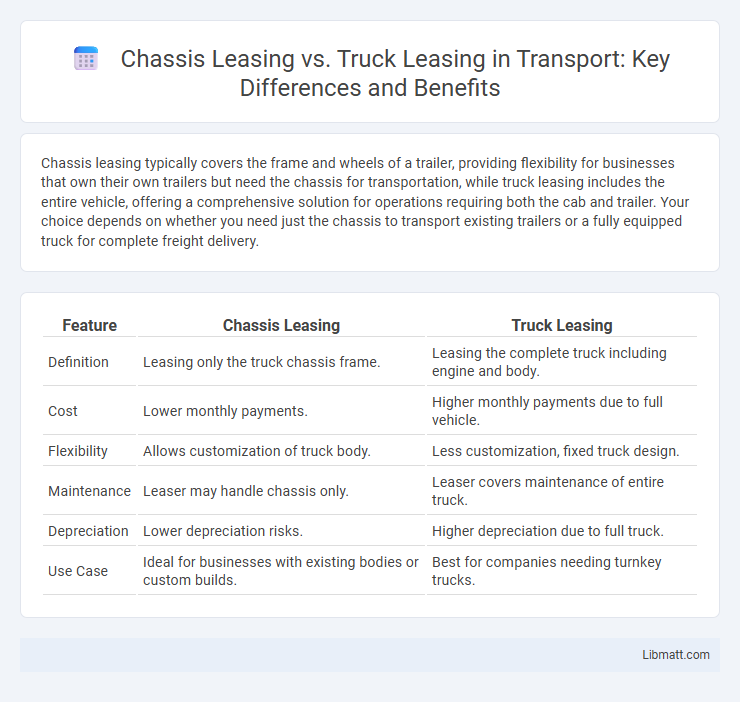Chassis leasing typically covers the frame and wheels of a trailer, providing flexibility for businesses that own their own trailers but need the chassis for transportation, while truck leasing includes the entire vehicle, offering a comprehensive solution for operations requiring both the cab and trailer. Your choice depends on whether you need just the chassis to transport existing trailers or a fully equipped truck for complete freight delivery.
Table of Comparison
| Feature | Chassis Leasing | Truck Leasing |
|---|---|---|
| Definition | Leasing only the truck chassis frame. | Leasing the complete truck including engine and body. |
| Cost | Lower monthly payments. | Higher monthly payments due to full vehicle. |
| Flexibility | Allows customization of truck body. | Less customization, fixed truck design. |
| Maintenance | Leaser may handle chassis only. | Leaser covers maintenance of entire truck. |
| Depreciation | Lower depreciation risks. | Higher depreciation due to full truck. |
| Use Case | Ideal for businesses with existing bodies or custom builds. | Best for companies needing turnkey trucks. |
Introduction to Chassis Leasing and Truck Leasing
Chassis leasing involves renting the metal frame used to support and transport shipping containers, essential for intermodal freight transport, while truck leasing refers to acquiring vehicles designed for hauling trailers or cargo. Chassis leasing optimizes container mobility without the need for full truck ownership, whereas truck leasing provides comprehensive access to powered vehicles for over-the-road freight operations. Both leasing types cater to different logistics requirements within the transportation industry, emphasizing flexibility and cost management.
Key Differences Between Chassis and Truck Leasing
Chassis leasing involves renting the frame that supports shipping containers, primarily used in intermodal freight transport, while truck leasing leases the complete vehicle including the engine and cab for road haulage. Chassis leases often have lower monthly costs and are tailored for container movement, whereas truck leasing covers broader applications with full vehicle maintenance options. Understanding the operational needs, usage frequency, and maintenance responsibilities is essential to choose between chassis and truck leasing effectively.
Benefits of Chassis Leasing
Chassis leasing offers flexibility by allowing you to rent the framework separately from the cargo container, reducing overall costs and maintenance responsibilities. This approach ensures compatibility with multiple container types, enhancing logistical efficiency for businesses handling diverse freight. Leasing a chassis can optimize fleet utilization and minimize downtime by providing readily available equipment tailored to specific transportation needs.
Advantages of Truck Leasing
Truck leasing offers you greater flexibility by providing access to the latest models and advanced technology without the high upfront costs associated with purchasing. Leasing also reduces maintenance expenses since many agreements include repair and service packages, ensuring your truck stays in optimal condition. Additionally, truck leasing improves cash flow management, allowing you to allocate capital toward other essential business operations while maintaining a reliable fleet.
Cost Comparison: Chassis Leasing vs Truck Leasing
Chassis leasing generally incurs lower upfront and maintenance costs compared to truck leasing due to the simpler design and reduced mechanical complexity. Truck leasing includes higher expenses for engine, transmission, and overall vehicle upkeep, impacting your monthly payments and total cost of ownership. Evaluating your operational needs helps determine whether chassis leasing or full truck leasing offers the most cost-effective solution for your fleet management.
Flexibility and Customization Options
Chassis leasing offers greater flexibility by allowing businesses to match specific chassis types and configurations to their unique cargo requirements, enhancing operational efficiency. Truck leasing provides customization options primarily through vehicle specifications and add-ons, enabling tailored solutions for varied transportation needs. Both leasing types support scalable fleet management, but chassis leasing excels in modular adaptability and rapid reconfiguration.
Maintenance and Support Services
Chassis leasing often includes comprehensive maintenance and support services specifically designed to ensure optimal structural integrity and operational efficiency, reducing unexpected downtime for your equipment. Truck leasing agreements typically cover engine, transmission, and safety system maintenance, providing regular inspections and repairs tailored to vehicle performance. Choosing between chassis and truck leasing depends on your need for specialized support, with both options offering service packages that protect your investment and keep your fleet running smoothly.
Ideal Scenarios for Chassis Leasing
Chassis leasing is ideal for companies engaged in intermodal shipping or container transport, where specialized frames are needed to support containers without owning the containers themselves. Businesses requiring flexibility in fleet management benefit from chassis leasing to reduce capital expenditure and avoid maintenance responsibilities. This option suits firms that operate across multiple ports or terminals, enabling easy access to chassis without long-term commitments.
When to Choose Truck Leasing
Choose truck leasing when your business requires a complete vehicle ready for immediate operation, especially if managing maintenance and registration is a concern. Truck leasing offers flexibility with customized terms suitable for fluctuating transportation needs and helps preserve capital by avoiding large upfront purchases. This option is ideal for companies that need reliable assets with available roadside assistance and comprehensive service packages.
Conclusion: Choosing the Right Leasing Option
Choosing the right leasing option depends on your business's specific logistics needs and budget constraints. Chassis leasing offers flexibility for carriers focused on container transport without the bulk cost of full trucks, while truck leasing provides a comprehensive solution including the vehicle and engine, ideal for long-haul freight operations. Evaluating factors such as maintenance responsibilities, contract terms, and operational requirements ensures the optimal choice between chassis leasing and truck leasing.
chassis leasing vs truck leasing Infographic

 libmatt.com
libmatt.com